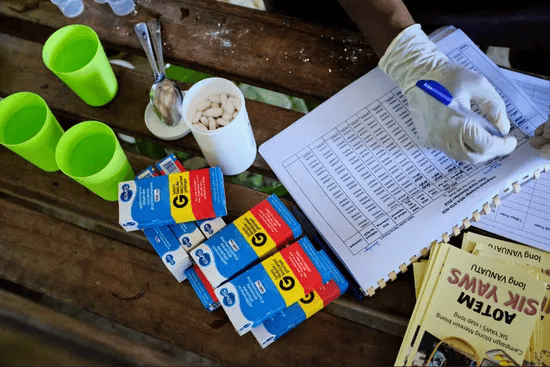
Supply chain management of NTD health products for NTD programmes
- Describe the standard operating procedures (SOPs) for supply chain management of PC-NTD drugs that are recommended for implementing MDA campaigns;
- Describe the roles and responsibilities for PC-NTD drug supply chain management;
- Describe how to apply the recommended measures for managing PC-NTD drugs and actively propose improvements in your context; and
- Adapt to your context, dissemination and use SOPs for MDA implementation.
This course explains the end-to-end process from planning and submitting donated drug requests through to waste management of expired and unserviceable stock and reverse logistics of unused tablets. It is essential knowledge for all levels of the health system that must work together to implement MDA.
In the context of MDA, supply chain management is a key determinant of success for campaigns. In addition to ensuring delivery in full, on time and to the right quality, preventive chemotherapy (PC) drugs for NTDs requires advance planning, coordination, responsibility and accountability at all levels of the health system – before, during, and after MDA. Therefore, for responsible and successful MDA, WHO recommends a set of standard operating procedures (SOPs) developed by ESPEN with support from ministry of health national NTD programs, NTD supply chain forum partners, implementing partners and donors.
Health workers are exposed to many different supply chain risks to NTD medicines management. These include: inaccurate data and records, insufficient stocks/stockouts, logistical delays, inappropriate storage, expired, damaged or contaminated stock, accountability issues for example.
Approximate course duration: 5 hours.
Languages
This course is available in the following languages: English
Content Warning: This course may contain images, videos, and multimedia materials related to healthcare that may include graphic depictions of medical conditions, surgical procedures, and other clinical content. These materials are intended for educational purposes to enhance understanding of real-world medical scenarios and are essential for the comprehensive learning experie
The target audience for this course are NTD program staff, pharmacists, pharmacy technicians, health officers, central medical stores and health facility staff, community health workers and MDA supervisors who take part in the handling of PC-NTD Medicines for MDA.
Assessment & Awards
You will receive a Confirmation of Participation upon completing all the modules in this course. Please note that this award does not serve as a professional qualification.
Other information
Guidance note
The content of this course has been validated, verified, and is owned by the Neglected Tropical Diseases Unit. This course is not a WHO Academy co-produced course. In case of any concerns or feedback on the course content, please share your feedback in the survey form at the end of this course.
Browser and device compatibility
For the best experience, we recommend using the latest version of Chrome, Firefox, Safari, or Microsoft Edge to access the courses.
Produced by Neglected Tropical Diseases Team.

